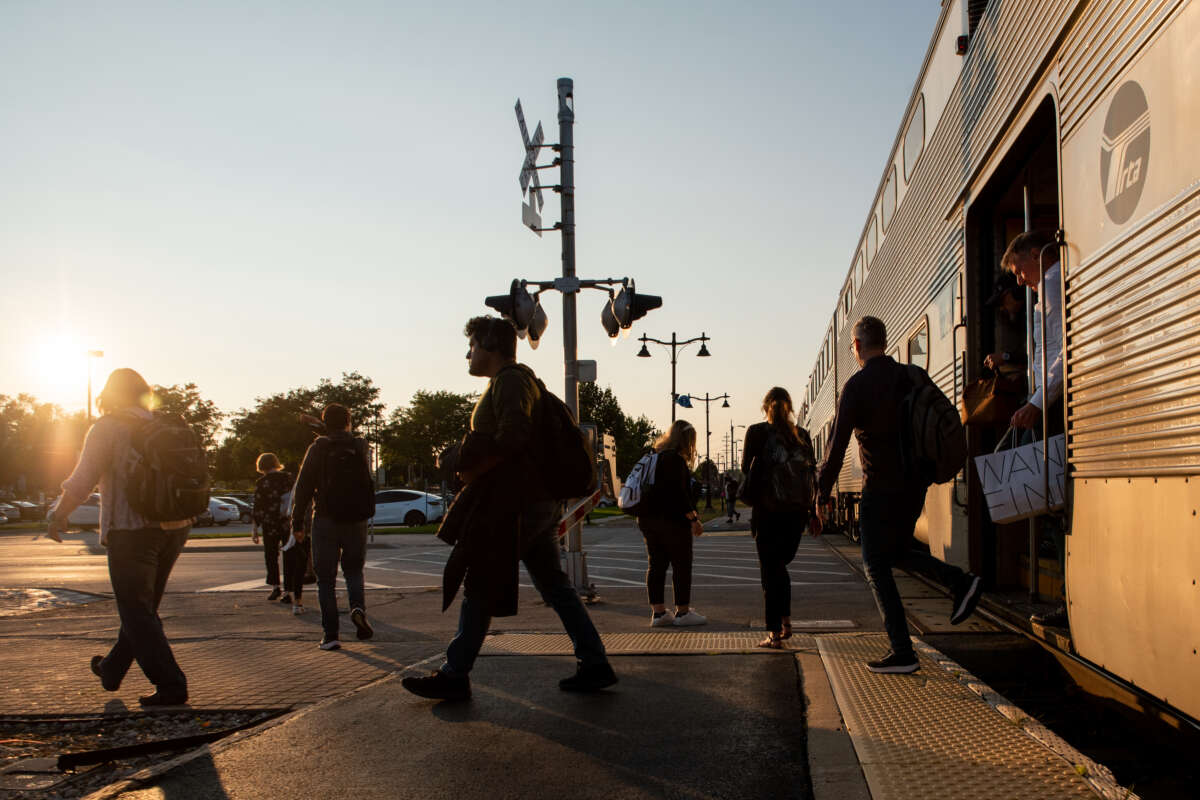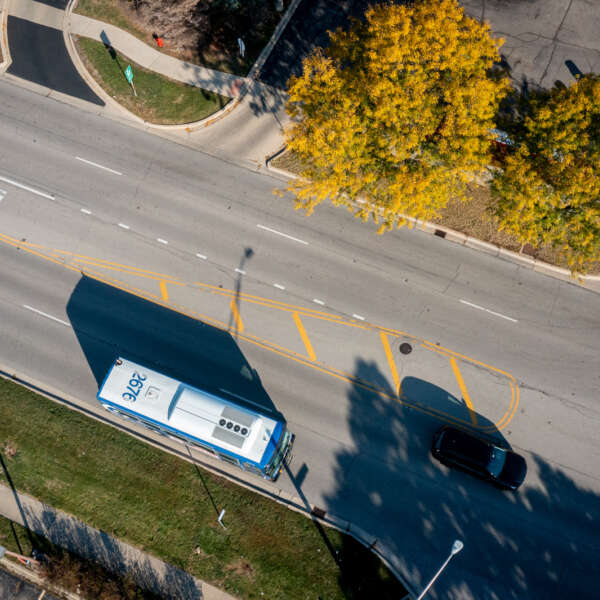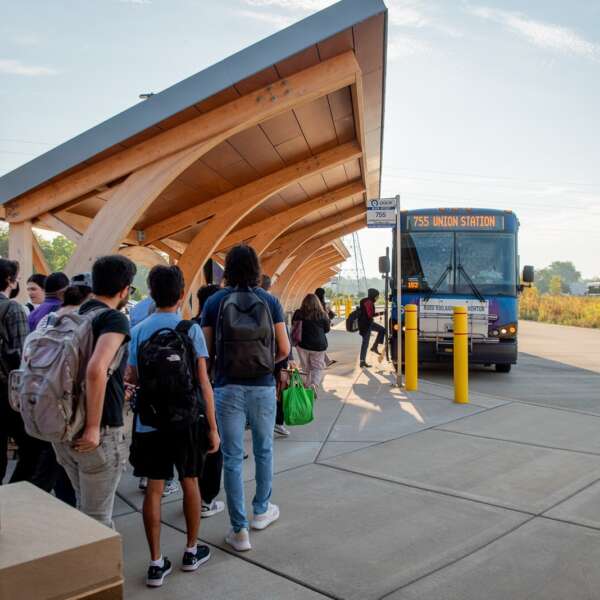First Transit is the Answer Coalition meeting tackles reduced fare and ride free program expansion
May 10, 2023
May 10, 2023

More than 100 riders, elected officials, advocates, and other stakeholders met virtually with the RTA on May 9 for the first quarterly Transit is the Answer Coalition meeting, receiving an update on strategic plan implementation and focusing on expanding the regional reduced fare and ride free program to people with low incomes. For 90 minutes, attendees learned from RTA staff on the agency’s current fare programs and possible ways to expand them and offered their recommendations for a path forward.
The first part of the meeting was an overview of Transit is the Answer, the RTA’s new regional transit strategic plan, highlighting the projects that fall under the plan’s actions for success:
Next, the RTA presented on fare programs, reminding attendees that a commitment from Transit is the Answer was to seek funding for an expanded regional free or reduced fare program available to people with low incomes. This commitment came from a robust engagement process during plan development involving more than 100 working group members, thousands of survey respondents, and interactions at community events in every county in the region.
RTA Principal, Intergovernmental Policy, Kyle Whitehead explained that this goal is closely linked to securing increased funding for transit operations. Without new public funding, the system is facing a $730 million operating shortfall starting in 2026 when federal relief funds run out.
Whitehead explained that these vital programs for vulnerable residents are drastically underfunded. Paratransit is federally mandated but hasn’t been appropriately funded since it was established in the ADA in 1990. This year the state appropriation for paratransit service is projected to cover less than 4% of the overall cost of the program. The situation is similar with the region’s free and reduced fare programs. The state appropriation covers less than 20% of the cost of free and reduced rides for seniors and people with disabilities. This means local agencies are left to cover the bulk of the cost of their general operating revenue. This is funding that could otherwise be used to support frequent and reliable fixed route service, so the lack of funding for these programs has trickle-down effects on service quality across the system.
If expansion of these programs were part of a larger funding package that included fully funding the existing programs, it could reduce the overall operating funding gap and help make our system more equitable. These are all critical programs that connect many of the most vulnerable people in our region to jobs, healthcare, and other opportunities. They give people with limited transportation options independence and the freedom to move. RTA and the Service Boards are fully committed to sustaining them now and into the future – but need more public funding.
The meeting ended with a passionate discussion among stakeholders about how an expansion of these programs might work. Options included:
Based on a poll, most attendees said an income-based program would be most equitable. But some arguments were made for a geography-based program as an opportunity to right the historic wrongs of disinvestment and to make accessing the free or reduced fares simpler. Some attendees referred to the success of the Fair Transit South Cook program, which offers up to a 50% fare reduction on Metra's Electric and Rock Island lines as well as increased service on Pace Route 352 Halsted, both sharing analyses and discussing how the program has been personally beneficial to them.
Some attendees argued an income-based program would require people to apply and prove their income to qualify, presenting a barrier to the most vulnerable. Social service workers on the call told stories of individuals they work with missing out on benefits they would qualify for because the application process is arduous.
Others argued that the most equitable option is a universal free or reduced fares system, which would benefit riders with low incomes without the barriers and would encourage riders of all incomes to get back on transit as the agencies continue to work toward regaining pre-pandemic ridership levels. Other conversations centered on urgency and the reality that, ultimately, state legislators will make the final decision on how to structure and fund a free or reduced fare program expansion, and the RTA’s role is to use data and stakeholder feedback to make recommendations and advocate.
The RTA will continue work on this action item and will continue engaging stakeholders along the way. Watch a recording of the full Coalition meeting online, and join the Transit is the Answer Coalition to be part of the process and stay informed on progress.
Subscribe to our Newsletter
Related Articles
 Coalition members provide feedback on ‘Transforming Transit,’ RTA’s vision for improved service and accountability
Coalition members provide feedback on ‘Transforming Transit,’ RTA’s vision for improved service and accountability
Nearly 200 riders, advocates, and other stakeholders met virtually with the RTA on February 11 for the sixth quarterly Transit is the Answer Coalition meetin...
February 20, 2025 Far South Halsted Corridor Study prepares for future Pace Pulse service
Far South Halsted Corridor Study prepares for future Pace Pulse service
An RTA Community Planning project kicked off in late 2023 as a crucial step in bringing Pace Pulse service to Chicago’s south suburbs. The Far South Halsted ...
February 19, 2025 RTA proposes reforms to prioritize capital projects, maximizing impact of funding
RTA proposes reforms to prioritize capital projects, maximizing impact of funding
RTA is proposing a historic restructuring of the region’s transit governance to maximize the impact of new operating funding and ensure all riders experience...
February 5, 2025 RTA proposes reforms to integrate fares, require accountability for faster and more reliable transit
RTA proposes reforms to integrate fares, require accountability for faster and more reliable transit
RTA is proposing a historic restructuring of the region’s transit governance to maximize the impact of any new operating funding and ensure all riders experi...
February 5, 2025 For the third year in a row, regional transit ridership was up by double-digits in 2024
For the third year in a row, regional transit ridership was up by double-digits in 2024
Ridership across the Chicago region’s transit system continued to increase throughout 2024, according to the latest data from CTA, Metra, and Pace. The regio...
January 28, 2025 RTA is seeking $1.5 billion in annual operating funding. What would that mean for your commute?
RTA is seeking $1.5 billion in annual operating funding. What would that mean for your commute?
On January 15, RTA released Transforming Transit, a vision for the regional transit system with $1.5 billion in annual operating funding supported by a stron...
January 28, 2025